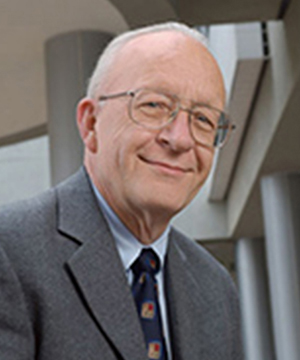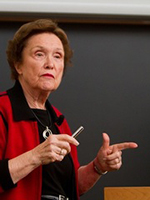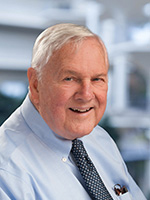By:
- Jade Griffin
Published Date
By:
- Jade Griffin
Share This:
UC San Diego Revelle Medalists Announced
The University of California San Diego is home to changemakers who champion the nontraditional. Since the campus was founded, our faculty members have aimed to tackle big ideas to make a difference both locally and around the world. Honoring the contributions of some of these outstanding current and former faculty members, the campus has announced the 2017 Revelle Medal recipients: emeriti faculty members Paul W. Drake, Marilyn Farquhar and Don Helinski.
The Revelle Medal was created in honor of Roger Revelle, who helped establish UC San Diego during his tenure from 1950-1964 as director of Scripps Institution of Oceanography. Today, it is the highest honor given by the Chancellor to a current or former UC San Diego faculty member. The Revelle Medal recognizes sustained, distinguished and extraordinary service to the campus. The medal also honors a record of accomplishment that advances UC San Diego in fulfillment of the campus mission of exceptional teaching, research, service and patient care.
“Roger Revelle had just one criterion for UC San Diego—that the campus should be distinctive. These three outstanding faculty members are visionaries who have brought Revelle’s vision to life during their time on campus,” said Chancellor Pradeep K. Khosla. “This year’s honorees have helped make UC San Diego the distinguished, world-renowned research university it is today.”
With excerpts from their nominations, the following honorees were selected from a prestigious group of nominees:

Paul W. Drake
It truly is difficult to overstate the depth and breadth of the contributions Professor Drake has made to UC San Diego.
Distinguished Professor Emeritus Paul W. Drake served in many critical positions on campus, culminating as Senior Vice Chancellor for Academic Affairs from 2007-2010. Together with faculty and staff, he helped steer UC San Diego through unprecedented fiscal challenges while maintaining its excellence in research and teaching. Drake presided as dean of the Division of Social Sciences from 1995 to 2007, when many of its departments raised their stature to become leading academic programs in the nation, and the division grew to encompass the largest number of faculty on campus and nearly 50 percent of undergraduate majors. To encourage diversity, Drake played key roles in the establishment of The Preuss School UCSD and the interdisciplinary Center for Research and Educational Equity, Assessment and Teaching Excellence (CREATE).
Drake also chaired the Department of Political Science from 1989 to 1993, during which time the department became ranked among the top 10 political science programs in the nation. Drake chaired or co-chaired 11 Ph.D. committees and received a campus award for undergraduate teaching. Between 1984 and 1989, he directed the Center for Iberian and Latin American Studies, which became a National Resource Center funded by the U.S. Department of Education. In those same years, he contributed to the launch of the School of Global Policy and Strategy.
An internationally respected scholar of Latin American politics and history, Drake has published dozens of research articles and 11 books, including three award-winning single-author volumes. His research has been supported by multiple prestigious fellowships and grants, from organizations such as Fulbright and the Ford Foundation. Drake was elected President of the Latin American Studies Association and appointed Chair of the Latin American Committee of the Social Science Research Council. At UC San Diego, he also held adjunct appointments in History and at the School of Global Policy and Strategy, and held the Institute of the Americas Chair for Inter-American Affairs.

Marilyn Farquhar
Few people have a perspective on cell biology that compares to Marilyn’s, but even fewer people can have the longevity of a career and a track record of mentorship like hers that spans five decades.
Distinguished Professor of Cellular and Molecular Medicine Marilyn Farquhar was raised on a farm in the Central Valley of California and entered the world of science during a time—in the early 1950s—when female graduate students were still quite novel. The underlying mystery of human disease fascinated her, and it was with this focus that she helped make a series of discoveries that are now part of the canon of cell biology.
After stints at the University of California, San Francisco, The Rockefeller University—where she became the first woman to be named a professor of cell biology—and Yale University, Farquhar joined UC San Diego in 1990, with her husband, famed physician-scientist George Palade. Farquhar served as the school’s first chair of the Department of Cellular and Molecular Medicine. She helped build the UC San Diego School of Medicine to become the top-ranked program it is today—the nation’s 18th best research-intensive medical school, according to U.S. News World Report.
Farquhar’s research accomplishments have been recognized by many prestigious awards including the E.B. Wilson Medal of the American Society of Cell Biology, the Distinguished Scientist Medal of the Electron Microscopy Society of America, the Homer Smith Award of the American Society of Nephrology and the Rous-Whipple Award of the American Society for Investigative Pathology. She is also well known for her dedication to teaching and mentorship, making a great impact in training the next generation of outstanding physicians and medical scientists.

Don Helinski
For more than 50 years, he has been both a pioneer and a champion for UC San Diego as it grew from a bold idea to the powerhouse it is today.
Professor Emeritus Don Helinski spent more than a half century on campus since joining the campus in 1965. He dedicated himself to serving as chair of the Department of Biology and associate dean of the Division of Natural Sciences (which later split to create the Division of Biological Sciences and the Division of Physical Sciences). He has remained involved with the campus that he helped shape, providing continued support and mentoring to graduate students, as well as to undergraduate students through the UC San Diego Emeriti Association.
Helinski is widely recognized as one of the true pioneers of recombinant DNA technology. He made many fundamental discoveries in the biology of bacterial plasmids and in the early applications of cloning technology that provided the foundation for early successes in genetic engineering and much of the biotech industry today. He has also served as an advocate for setting guidelines and policy for the application of scientific advances for the betterment of humanity.
In recognition of his scientific achievements, Helinski received the Guggenheim Fellowship and has been elected as a fellow of the American Association for the Advancement of Science, the American Academy of Arts and Sciences and the National Academy of Sciences.
The Revelle Medal was initially established in 1981 by Chancellor Richard C. Atkinson to honor distinguished and sustained service to the campus by community members and friends. In 2013, Chancellor Pradeep K. Khosla reinstated the Revelle Medal to honor current or former UC San Diego faculty members whose achievements are illustrative of UC San Diego founder Roger Revelle’s vision to attract distinctive and visionary faculty leaders.
Past recipients include: Walter Munk (2013); Shu Chien and Peter Gourevitch (2014); Cecil W. Lytle, Hugh “Bud” Mehan and Susan Shirk (2015); and Y.C. “Bert” Fung, Veerabhadran Ramanathan, Roger Reynolds and Palmer Taylor (2016).
Share This:
Stay in the Know
Keep up with all the latest from UC San Diego. Subscribe to the newsletter today.



